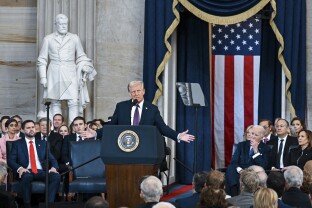Three major corporations recently told Congress they gave President Donald Trump’s inauguration more money than Trump’s committee previously revealed — in some cases, hundreds of thousands of dollars more — according to a NOTUS review of federal documents.
The discrepancies follow Trump’s record-breaking inauguration haul of nearly $250 million, which was about four times what Joe Biden raised for his presidential inauguration in 2021.
The newly disclosed numbers also underscore how presidential inaugurations have become lightly regulated affairs where billionaires and moneyed corporations can donate seven-figure sums and gain exclusive access to an incoming president, members of Congress and top administration officials.
General Motors told Congress this week that it gave Trump’s 2025 inauguration $1 million in cash and $538,000 worth of in-kind contributions in the form of “vehicles.” The Trump inauguration committee only reported the $1 million contribution from GM to the Federal Election Commission.
“GM’s disclosures are accurate,” spokesperson Elizabeth Winter told NOTUS. “I’d refer you to the committee regarding its disclosures.”
Amazon disclosed to Congress two payments to the Trump inaugural committee totaling close to $2 million. But the Trump inaugural committee told the FEC that it only received $1 million from Amazon. Amazon declined to comment.
Microsoft told Congress that it gave the Trump inaugural committee $1 million total in two separate installments. The Trump inauguration committee, meanwhile, reported to the FEC that it received $750,000 total from Microsoft. Microsoft declined to comment.
Separately, a new disclosure from insurance giant USAA also conflicted with what Trump’s inaugural committee told the FEC. USAA said it gave the Trump inaugural committee $100,000 in cash from its corporate treasury, but Trump’s inaugural committee told the FEC it received $100,000 from USAA’s political action committee — a smaller but critical distinction. The corporate PAC is funded by individual employees of the company and not the corporation. USAA did not respond to inquiries.
For each example, it’s unclear whether the Trump inaugural committee or the corporate donor disclosed incorrect or incomplete information.
Following publication of this article, the Trump inaugural committee filed an amended contribution report with the FEC. The committee increased the amount of money it says it received from General Motors and corrected its USAA entry to state the donation came from the company’s corporate treasury, not its PAC. The Amazon and Microsoft contribution listings remained unchanged.
“The Committee submits this statement to clarify certain entries,” Trump’s inaugural committee wrote in an explanatory memo to federal regulators.
Before the amended contribution report was filed, a source familiar with the Trump inaugural committee’s finances told NOTUS that the committee was reviewing the documents. The source blamed the issues on the companies.“This wasn’t a failure to report but a failure by corporations to send proper documentation,” the source said.
The FEC did not immediately respond to questions.
Trump basked in victory during his inauguration, which included a weekend’s worth of lunches, brunches, dinners, balls and confabs open only to individuals and corporations willing to pay six- or seven-figure amounts for access.
“For American citizens, January 20th, 2025, is Liberation Day,” Trump declared in his inaugural address. “America will reclaim its rightful place as the greatest, most powerful, most respected nation on Earth, inspiring the awe and admiration of the entire world.”
Critics of Trump’s inauguration panned it as a brazen example of pay-to-play politics.
“It’s basically the Wild West now,” said Dylan Hedtler-Gaudette, director of government affairs at the Project on Government Oversight, a nonpartisan nonprofit watchdog group. “There must be a robust conversation about whether corporate interests should be able to contribute to these kinds of committees in the first place.”
In January, Democratic Rep. Mary Gay Scanlon reintroduced the Inaugural Fund Integrity Act, which in part would mandate rapid disclosure of inaugural committee contributions and cap them at $50,000 — they’re presently unlimited. The bill would also require presidential inaugural committees to publicly disclose how they spend their money, which is not currently a requirement. The bill is unlikely to go anywhere in the Republican-controlled House.
It’s also unlikely either the Trump inaugural committee or any of its donors would face any consequences for the botched disclosures.
In 2021, the FEC’s Office of the Inspector General detailed what it considered a “lack of FEC oversight” regarding alleged financial irregularities stemming from Trump’s 2017 inauguration.
But the FEC — an independent, bipartisan agency — has not acknowledged adopting any of the inspector general’s recommendations.
The agency, which processes and publishes presidential inaugural committee financial reports, now finds itself in a state of de facto shutdown because it doesn’t have the minimum number of commissioners required — four — to conduct high-level business, such as formalizing investigations and issuing civil fines.
Trump alone may nominate new FEC commissioners, which the U.S. Senate then must confirm. Despite congressional leaders presenting Trump with three experienced candidates, Trump has not nominated anyone.
Editor’s note: This story was updated to include the Trump inaugural committee’s amended contribution report, which was filed with the FEC after publication.
Sign in
Log into your free account with your email. Don’t have one?
Check your email for a one-time code.
We sent a 4-digit code to . Enter the pin to confirm your account.
New code will be available in 1:00
Let’s try this again.
We encountered an error with the passcode sent to . Please reenter your email.


